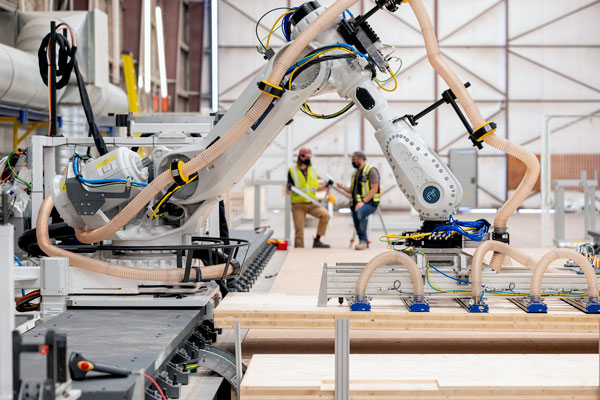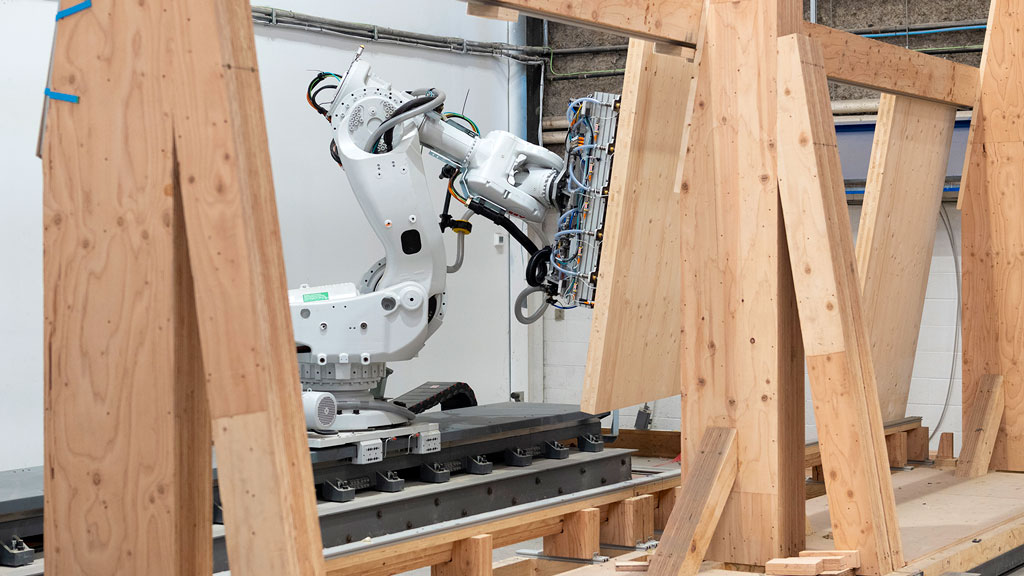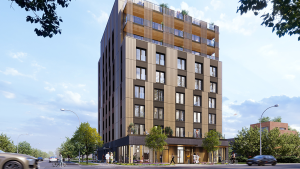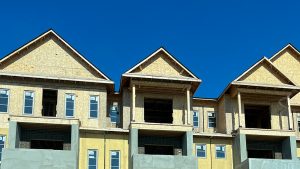Intelligent City, a Vancouver company that produces mass timber housing, has started using robots to produce Passive House panels at a factory south of the city.
The facility uses robotics and digital technology to bring together panel design and production, two processes that are usually carried out separately and sequentially.
“The factory was set up at the end of 2021 and started producing commercial mass timber panels in January 2024,” says Oliver Lang, CEO and co-founder of Intelligent City.
The factory has five big industrial robots arranged in manufacturing assembly zones that together comprise a safe assembly line.
The robots, which are remote-controlled with proprietary software, lift, position and custom-cut panels of mass-timber walls, floors and ceilings.
Electrical channels and ventilation ducts are cut into the panels before they leave the factory.
The factory is located on River Road in Delta, about a 10-minute drive from the George Massey Tunnel, which is roughly half-way between downtown Vancouver and the U.S. border.
The facility will supply the facade system for BC Indigenous Housing Society’s new nine-storey mass timber multi-family housing project on the east side of Vancouver.
The design uses cross laminated timber floors and envelope panels.
The panels will be installed in a basket-weave pattern around the exterior of the building.

Lang says Intelligent City creates carbon-neutral housing that enables urban densification.
“We have two fundamental goals,” he says. “Affordability of supply and reduced carbon emissions.”
Intelligent City was founded as an architecture firm in 1999.
In 2010, having spotted a hole in the market, it spun out a sister company to deliver entire projects.
“We provide design-build housing solutions,” says Lang. “Our preferred customer is one who wants a fully-integrated solution from us.”
Lang says Intelligent City focuses on buildings that are six to 18 storeys high.
Until now the maximum height of a mass timber building in B.C. has been 12 storeys.
It is expected, however, that the B.C. government will amend the provincial building code to enable mass timber construction to go higher.
The change, when it takes place, will lift the permissible height of mass timber buildings to 18 storeys, an increase of 50 per cent.
“Smart densification is the direction many cities are going in,” says Lang. “They’re sometimes called 15-minute cities.”
The 15-minute city is an aspirational urban planning concept in which most daily necessities – work, shopping, education, health care and leisure – can be reached in 15 minutes on foot, by bike or public transit.
The goal of the 15-minute city is to reduce car dependency, promote healthy and sustainable living and improve the well-being and quality of life of city dwellers.
Many people in the construction industry are touting offsite production of building components and their assembly onsite as a logical way to tackle such ongoing challenges as materials scarcity, supply chain distortions and labour shortages.
When done right, they say, design for manufacturing and assembly (DFMA), can mitigate risk and increase efficiency.
Craig Mitchell, a West Vancouver-based modular and offsite construction consultant, says the practice started in Europe (Germany, Austria and Sweden) and spread to North America.
“Europe’s ahead of North America in producing components and shipping them to site for assembly, instead of doing everything onsite,” says Mitchell. “The Europeans started 20 years ago, but Canada is quickly catching up.”
He says B.C. is a leader in producing high-performance panels that are strong, energy-efficient and well insulated.
“But the U.S. is ahead of Canada in modular and mass timber construction, because it has a larger and more geographically concentrated market than we have,” he says.
Mitchell says the benefits to customers of DFMA, in the form of speed and efficiency, means there will be more off-site fabrication of building components in the future.
Its attractions notwithstanding, DFMA has its challenges.
“In order to do offsite construction well, a company needs to be well capitalized, because advanced processing digital tools and robotics are expensive,” says Mitchell.
Off-site production needs to operate like an auto assembly line.
“If there are any gaps in production, you’re losing money,” he says. “Traditional construction, where you’re doing everything onsite, doesn’t have that problem.”
Apart from the cost, adding a digital component to the traditionally analog processes of design, manufacturing and assembly can be tricky to co-ordinate and requires experience and expertise.
“General contractors in Canada are still trying to figure out off-site prefabrication,” says Mitchell. “It’s still only a small part of total construction in Canada, but it’s growing quickly. And right now the way to learn it is by doing.”





Recent Comments
comments for this post are closed